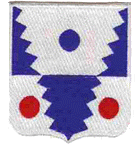
Earl K "Kenny" Cavanah
Many thank you to Marty Cavanah, son of Earl K Cavanah for sending me the memories of his father. And for sending me many pictures. A real treasure in which I had to make a hard choice.
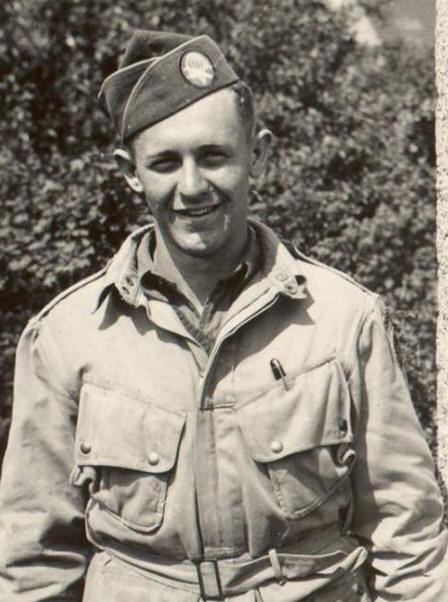 <-
Kenny Cavanah, Germany 1945
<-
Kenny Cavanah, Germany 1945
"Today" ->
Earl Kenneth “Kenny” Cavanah was born on November 11, 1924 and lived all his life in Independence, Missouri. He was a member of the greatest generation.
“My Dad had a older brother Gail and a younger sister Ruth. Gail passed away 20 years ago and Ruth is still alive living in Oklahoma. Dad grew up during the depression and his Dad ran a gas station. They lived above the gas station. In addition as times were tough his Dad had a ice business delivering ice to people before refrigerators were common. His brother had a root beer stand next to the gas station that sold hotdogs, ice cream and root beer. It closed when the war began.”
Earl was drafted into the Army in April 1943 where he was inducted at Leavenworth, Kansas.
“He boarded a train and traveled several days on a troop train until it arrived at Camp MacKall where he was told he was in the 17th Airborne 193 Glider Infantry, Headquarters Company. He has many photos of his time at Camp MacKall, Camp Forrest, and at the end of the war in Germany. He has no photos taken during his time in England.
He always said that being in the Army was very good for him as it made him grow up fast and that he was able to make a lot of good friends. He then left Camp MacKall with the 17th Division to participate in the Tennessee Maneuvers, which he described as being very difficult. He said that the living conditions were almost as bad as being in combat with the exception no one was shooting live ammunition at them.
However, in one of his letters he mentions some soldiers who he did not know drown while crossing a river during the maneuvers. He remembers during the maneuvers going up to farmers and paying them to cook some food for them and how good that food tasted. From there they were sent to Camp Forrest,which he described as being a much-improved camp than Camp MacKall. He said that they actually had real barracks instead of tarpaper shacks.”
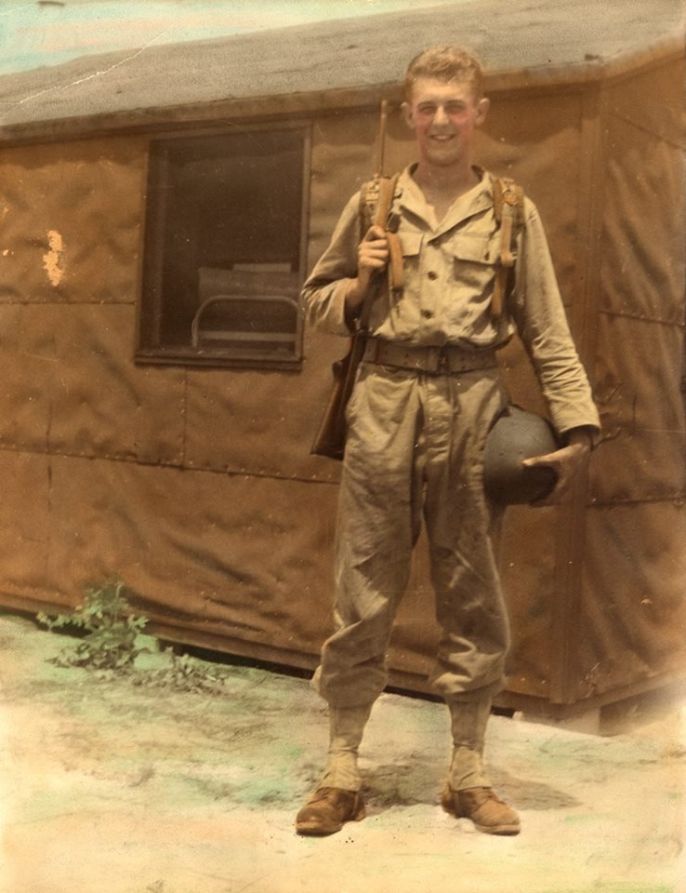 <-
Camp McKall 1943
<-
Camp McKall 1943
At Camp Forrest, Tennessee, the Glidermen who wished, could spend their parachute badge. To receive the $50 prime that the paratroopers received. To do this, a jump school was created and directed by the officers of the 513th PIR.
“At that time the Glider Regiments did not get any additional pay for their status. He signed up for that and went through all the training and several days before he was to make his qualification jump Congress passed legislation that allowed the Glider Regiments to receive the same additional $50.00. At that point Dad said he saw no reason to jump out of an airplane as he was getting the same pay.”
On August 14th, 1944, Kenny Cavanah left for Europe, after going through camp Miles Standish in Taunton, Massachusetts. On August 20th, he left Boston, heading out to sea towards Liverpool, United Kingdom, aboard USS Wakefield. After 8 days across the ocean and two days on a train, he reached Camp Chiseldon, near Swindon, Wiltshire, on August 30th. The troops had to build their own facilities prior to go on with training and manoeuvring, day and night in the surrounding countryside. In September, the 17th Airborne was placed on alert, as a potential reinforcement for the 82nd and 101st Airborne engaged in the Netherlands during the Market Garden Operation, but did not had to intervene.
“he was able to go into London and some of the surrounding towns. He loved the fish & chips and saw the damage done by the V1 & V2 rockets aimed at London. He said that life was pretty good in England with the exception of his whole company got sick from spoiled turkey served to them on Thanksgiving.”
On December 19th, 1944, the 193rd GIR received word that it would be transferred on short notice into the Belgian Ardennes region, to face a major German offensive launched 3 days earlier. Preparations are made hastily.
“He stated that after landing in France they boarded large cattle trucks and were trucked up to the front where their first assignment was to guard the bridges over the Meuse River. He said that there was no combat at that time but at night he heard his first German jet. He stated that it created a noise that they had never heard and didn’t know what it was until being told that it was a jet. They called the jet bed check Charlie as it came over every night. I think this town might have been Charleville, France where they guarded the bridges.”
The New Year's Day 1945 in the evening, the men boarded trucks that took them in
Belgium. Time fighting approached.
On Sunday, January 7, 1945 was the day of the baptism of fire for Kenny and his
comrades. The snow, up to the knee, the temperature was around -6°C and fog
limited visibility of 20 to 300 meters. But Kenny did not want to talk about
this difficult period.
“He mostly talked about how cold it was and the hardship of sleeping outside in a foxhole with deep snow everywhere. Dad never did enjoy camping out or going on scouting overnights after that. He always said that he had enough of sleeping outside while in the Army. He said that he was always cold and could never get warm. During the daytime they might be able to build a fire to try to warm up but at night you just had your clothes and a blanket and shelter half to keep you warm. He always said that there was someone in charge who made a stupid mistake by taking their rubber boots and winter overcoats away from them when they went into combat. They were suppose to get them back that night and they never saw them again until the conflict was over. He always wondered who made such a stupid decision that cost those dearly due to the harsh winter conditions.& He always hated going on guard duty during the middle of the night as your eyes would always play trick on you thinking that you would see something when there was nothing there. He went almost 6 weeks without a bath or change of clothes. The best they could do was to wash and try to shave out of their helmets. When they were pulled off the line they were taken somewhere where they were able to take showers and get cleaned up. He said that was such a delight to get cleaned up after living in those conditions. He would never talk much about his combat experience, which is very typical. He would just say that he was very lucky. He talked about being shelled by the German 88 and Screaming Meamies, which were terrible.”
February 6, 1945, the HQ of the 17th Airborne Division learned that the "Varsity" operation aimed to establish a bridgehead on the east bank of the Rhine River during the second half of March. Capital element of the airborne assault, the division leaving the Grand Duchy of Luxembourg to prepare the major Airborne assault. Thus, 193GIR arrived at Chalons-sur-Marne on 11 January at 7:30 pm.
“After the Bulge the 193rd was disbanded and those who survived were transferred into the 194th, B Company. When he crossed the Rhine River during Operation Varsity he did not know anyone at that time, as he was new to that unit. He could not remember who was actually in his glider when they crossed but became friends with several at the end of the war who he kept in contact with throughout his life.”
On 24 March 1945, the D-day, the men boarded gliders. Destination, "Landing Zone-S" north of Wesel. The flight from Kenney went well until the landing.
“He said as their glider was cut loose they were heading straight for some trees when the pilot froze. He thought for sure they were going to crash into the woods as the pilot and co-pilot began fighting for control of the glider. Fortunately the co-pilot took control and pulled the glider up and over the trees where they landed in another field across from a canal and through several fences. Their glider stopped right next to two German anti-aircraft guns with the Germans still on the guns. However, they had surrendered, as there were several American soldiers with their guns in the German’s back. He said that their first objective was a farmhouse that they took and captured about 20 German soldiers. He observed a pair of German binoculars on a table and took them. Shortly after landing numerous transport and B24 bombers flew over very low and were dropping supplies to the airborne soldiers. Dad observed one of the flight crew who was pushing the bundles out become tangled in the parachute and fall to his death near where Dad was standing. They went over to him but he was dead.”
Later, he learned another bad news.
“He learned that his good friend Cecil Dawson who was Kitzmiller, Maryland was killed as he stepped out of his glider. He later went to visit Cecil Dawson’s parents after the war.”
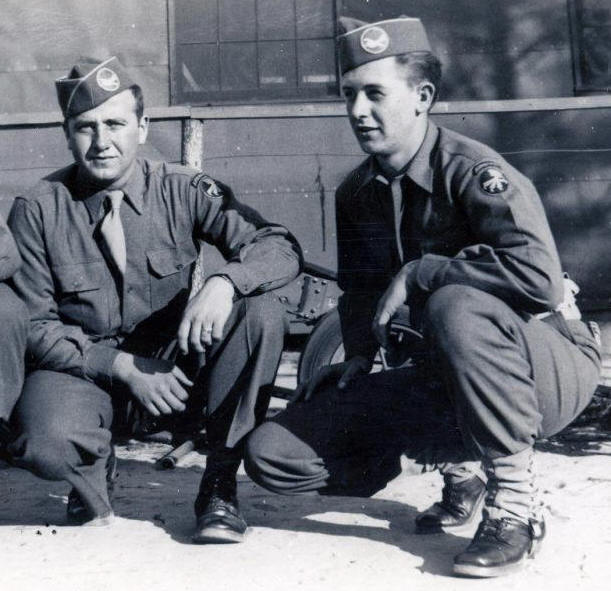
Cecil Dawson
to the left, Kenny Cavanah to the right. Photo taken at Camp Mackall in 1943
Again, most of the things that happened to him, Kenny does not want to talk.
“Growing up I was always interested in what Dad did during the war and he was somewhat reluctant to talk much about it. In later years as he and Mom would go to various reunions and I joined him in with the last 4 reunions. In later years he opened up more about his days in the Army but over the years I think he forgot a lot of the details, as he did not feel it was important. I believe what he felt was more important was his current life and his family. I had talked to several of his friends who remember him during the war and mentioned things he did that he could not remember. He would always say that I knew more about his days in the Army than he did. One friend Bud Duddenhoffer who has a book for sale on Ebay about his days in the 17th. He even mentions my Dad in the book and capturing a large number of Germans. Dad does not remember this but he always could say a few German phrases that meant Hands Up and Surrender, and Come Out.
Another soldier named Tiger Tarkowski said my Dad kept him from throwing a grenade into the basement. He said Dad told them to come out with their hands up and a family of German civilians came out of the basement in Munster. He said he was very grateful that Dad kept him from throwing the grenade. Again, Dad says he does not remember this or another time when Tarkowski said they were being shelled by the Germans and he hid behind a tank. He said Dad told him to get away from the tank which he did and moments later the tank was hit.
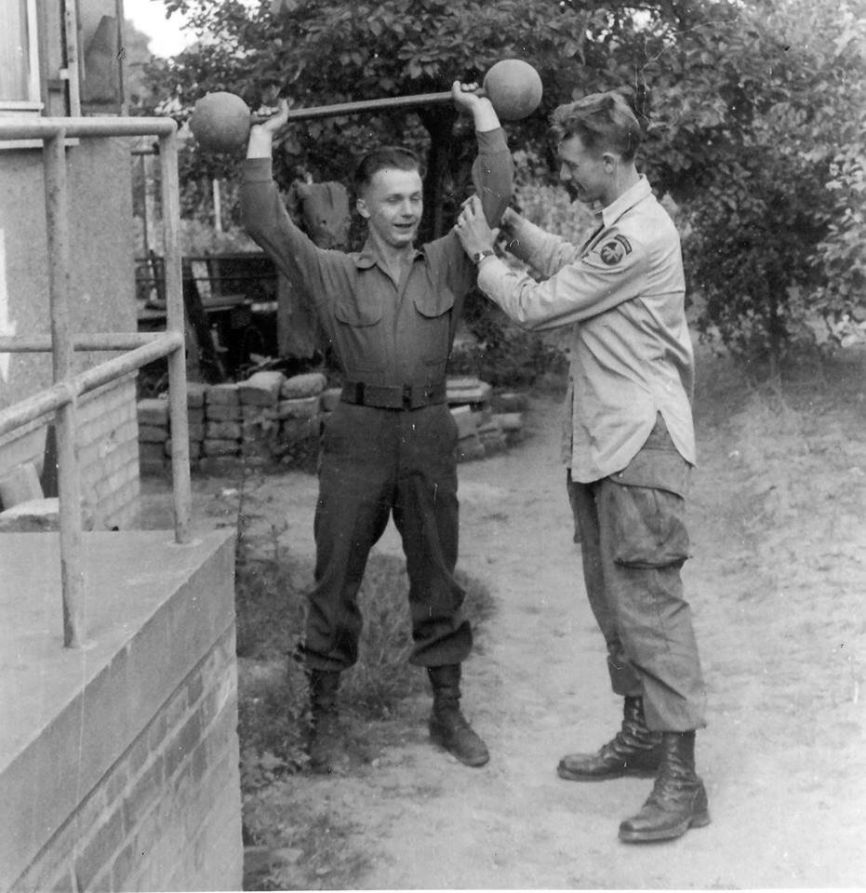
Kenny Cavanah (right) with Tiger Tarkowski. Germany 1945.
None of these events Dad recalls so I don’t know if Dad just doesn’t remember or if these other two soldiers are mistaken. One event that Dad remembers well is when his friend Maurice Mathews was killed by another American soldier from another airborne division. The war had ended and they were in Luneville, France waiting to head home. He said that he and Maurice Mathews along with a third friend went into town that was crowded with other American soldiers. He said four other soldiers from another airborne division came up to them trying to get them to fight telling them how tough they were
He said the other four were drunk so the three of them were just trying to talk there way out of a fight. Dad said that none of them cared to fight and felt they could talk their way out of a fight. Then one of the soldiers pulled out a handgun and shot the one in the middle killing him. He stated that the four ran off and he called the MP’s who showed up along with an ambulance that was driven by a medic by the name of Tetlow who Dad knew from his hometown of Independence, Missouri. He said they loaded Mathews up into the ambulance and he was dead before they arrived at the hospital. It was so tragic that Mathews made it through the Bulge and Varsity only to be killed by another American soldier. Apparently this was not too uncommon with the war being over and everyone had weapons and alcohol with nothing to do while awaiting shipment home. Years later we learned where Mathews was buried in Parsons, Kansas so we went to the cemetery and met with his cousin who was the only family member still alive. As to the soldier who shot Mathews, he was caught that night and they had a court martial within a few weeks of the shooting. He was found guilty and sentenced to death by musketry. Shortly afterwards Dad was shipped home so he never did hear if the soldier was actually executed. Dad always thought that they probably commuted his sentence due to battle fatigue but he does not know for certain. It was something Dad always wanted to know but we were never able to find anything out about it. Dad was transferred to the 13th airborne division and came home with the 13th patch on his Ike Jacket. He shipped out around August 12, 1945 from La Harve, France on the USS Thomas Barry. He learned of the atom bomb being dropped while at sea and it was then he learned that the war was over and he would not have to go to Japan.”
August 21, 1945, Earl K Cavanah was back in the United States. But he was discharged in the month of December with the rank of Corporal. Despite terrible fight and especially during the Battle of the Bulge, he was not injured.
“Dad was not injured during the war but he later received money from the govt for the damage done to his ears and feet during the Bulge. The govt gave him hearing aids. He never was pulled off the line for frozen feet but there was nerve damage caused by the extreme cold. I had heard that some soldiers actually received purple hearts for frozen feet. He received the standard decorations combat infantry badge, bronze star for participating in Operation Varsity.”
And from the point of view Psychological?
“Dad never suffered any PTSD and always spoke about how he was lucky during the war. He was shelled during the Bulge and Varsity but I don't think he had many close calls with death other than when the almost crashed into the woods while landing. I can recall about 7 years ago he had surgery and was having some difficulty in his recovery. He was under medication and he was talking about the 88's and it appeared to me that he felt like he was in combat. When he recovered he never remembered this.”
Kenny, like many other soldiers brought back many memories of objects from this period:
“He did bring back a lot of souvenirs from his Army days. He has his Ike jacket with decorations, his helmet liner which I played with growing up. He has a paratrooper switch blade which are not too common, German Mauser Hsc and holster which I have. German coins, Nazi flag and arm band, medals, two german swords, and german hunting trophy sword with the name Polismeister Born Essen, Germany 1936 which is in mint shape. Several watches one which he found in an SS Barrack and several he liberated from German soldiers. He always felt bad about taking their watches in later years. And the most valuable is the photos he took.”
Like most American soldiers, Kenny came home and resumed the course of his life. Fond a job, raised a family. Forget what had happened, or at least do not talk about it.
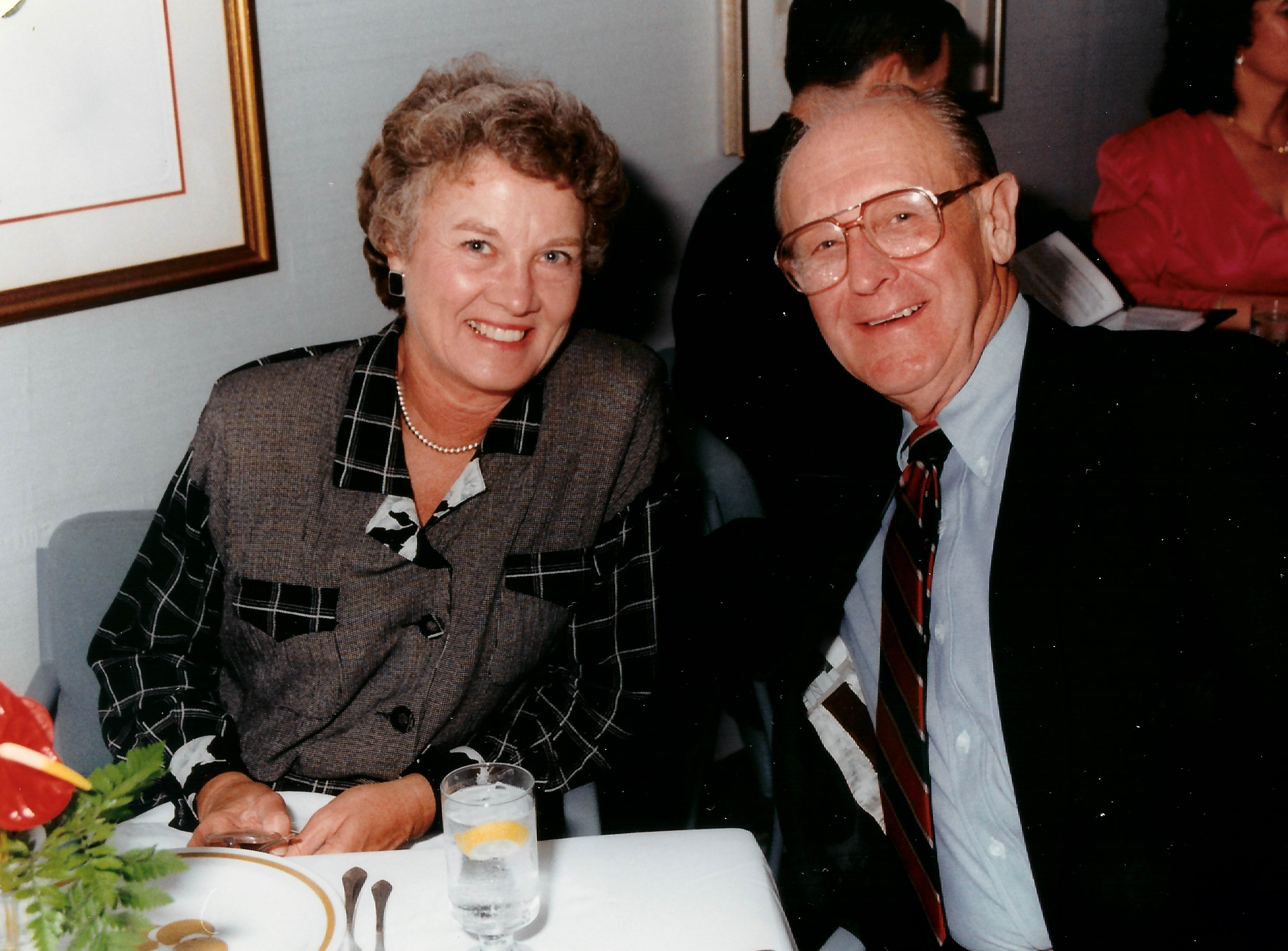
Earl K Cavanah and his wife Mary Eleanor Cavanah.
“Dad went to work for Southwestern Bell Telephone in 1946 and worked there for 38 years. He married my mother Mary Eleanor Cavanah in 1950 and raised myself and an older sister Marilynn. Me, I have been married 33 years to a wonder wife named Cindy. We are both retired. I retired last year after 36 years with the Independence, Missouri Police Dept. We have a son David who is married and is a school counselor. They have a 11 month old daughter which is our first grand baby. We get to watch her and help out with them as they live nearby. We also have a daughter Katie who is a Surgical Nurse with a local hospital. She also lives nearby and we are fortunate that we get to spend time with our children.
My older sister Marilynn who has a son and daughter. The four cousins are all close and there were very close to their grandfather.
My Dad passed away earlier this year on April 21, 2013 having lived a wonderful life, loved by many and blessed with many good friends. He enjoyed a long and happy retirement. He was married to my Mom for 53 years until she passed away in 2003.
He lived a very happy life and always felt that he was extremely lucky and blessed throughout his life. I feel that I was extremely lucky and blessed to call him my Dad.”
Earl
with his daughter Marilynn and his son Marty."About 5 years ago we had a family reunion at Durango, Colorado.
It was during Father's Day so we surprised Dad with a glider flight.
He got to go up for about 30 minutes in the Colorado mountains and loved every minute of it."